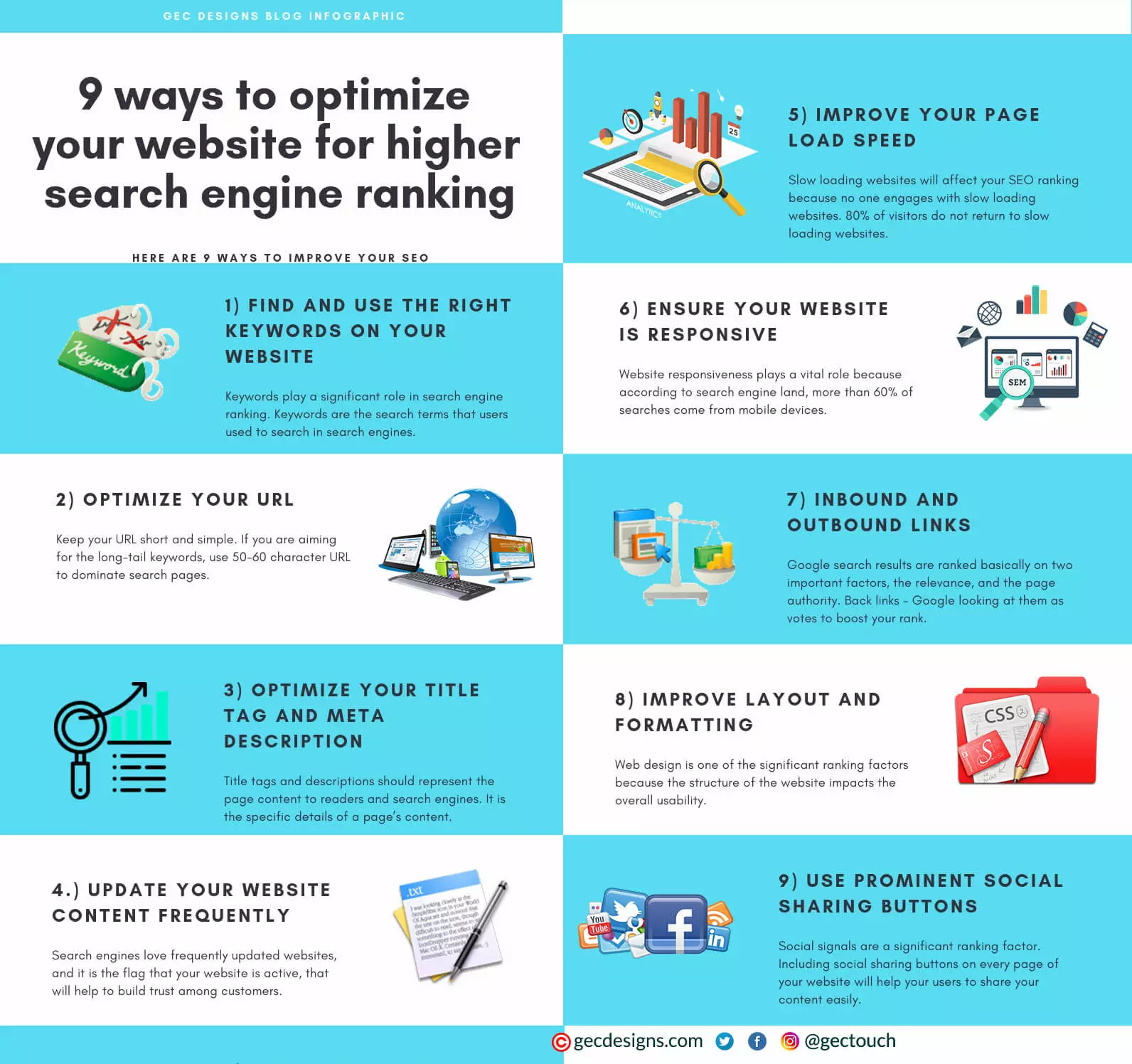9 ways to optimize your website for higher search engine ranking
Are you struggling to improve your website ranking in search engines? If so Don’t worry, you are not alone, every business owners, marketers, bloggers are struggling.
Everyone wants to improve their website ranking in search engines, and that is considered to be the main objective of online businesses. But why there is a huge race for the first-page ranking? Below are a few interesting stats that would help you to understand the importance of getting listed in the first-page SERP.
According to Forbes,
- The first page results of Google has captured 92% of clicks in recent years.
- The first five results receive 67.6% of clicks.
SEO – What is SEO? SEO stands for search engine optimization. SEO is the technique that helps to improve your website’s visibility in search engine result pages. There are some basic things you can do to improve your website ranking.
In this article, We are discussing the 9 effective ways to optimize your website for higher search engine ranking quickly.
- Find and use the right keywords on your website
- Optimize your URL
- Optimize your Title tag and Meta description
- Update your website content frequently
- Improve your page load speed
- Ensure your website is responsive
- Inbound and outbound links
- Improve layout and formatting
- Use prominent social sharing buttons
Getting a higher ranking in SERPs is a highly competitive task to achieve, but with the right techniques, continuous research, and improvement SERP goals are achievable.
Find and use the right keywords on your website
Keywords play a significant role in search engine ranking. Keywords are the search terms that users used to search in search engines. Keywords on your website help search engines to understand the content on your website. So search engines like Google increase your visibility for relevant searches.
To improve your search engine ranking, identify the keywords consumers are using in the search engines to find the products or services similar to yours because they are not searching for your business or website directly. They are looking for valuable information to solve their issues. so find the keywords that are relevant to your business.
You can use tools like Google keyword planner, Semrush, and Ahrefs to find the best keywords for your business. These tools will give a list of keywords for your website.
Keyword research begins with understanding your business and your target audience, then brainstorm possible search terms. Use keyword research tools and narrow down the list by competition level and commercial intent.
Focus on keywords that have medium or low competition.
After discovering your target keywords add those words throughout your websites such as URLs, title tags, meta descriptions, page titles, contents, and image captions.
If you optimize your website with the right set of keywords effectively, that will be the first step to get a better rank in search engines. The right use of keywords will boost your visibility in search engines for sure, and the probability of getting more traffic to your website will be higher.
Related post: How to do keyword research? – The beginner’s guide
Optimize your URL
Website page URLs can impact your ranking and visibility. You should optimize page URLs for higher search engine rankings. A URL (uniform resource locator) is a webpage address. Actually, URL provides information to both humans, and search engines about the web page overall.
Keep your URL short and simple. If you are aiming for the longtail keywords, use a 50-60 character URL to dominate search pages. Here we give some tips for URL optimization
URLs must be easily readable by everyone – Page URL must be readable to both readers and search engines. Some content management systems automatically generate URLs that include unnecessary parameters, database IDs, or query strings. That is known as a dynamic URL.
eg: https://exampledomain.com/index.php?=264798&pageid=489
Search engines can understand the dynamic URLs, but the readers cannot understand what the page is all about. So to improve your ranking in search engines, choose static URLs instead of dynamic URLs.
Example for static URL: https://exampledomain.com/blog/how-to-optimize-url-for-seo
This type of URL can be easily understood and recognize by readers.
Use lowercase letters - The best practice is always use lowercase letters in your URLs because uppercase letters in URLs can lead to 404 errors on some servers like Linux, Unix.
Use hyphens instead of an underscore in URLs – Use hyphens for putting spaces between words. If you use underscores to separate words, Google does not treat an underscore as a word separator. So Google will read it as one single word.
For example, “how_to_optimize_url” is “howtooptimizeurl” to Google which will be harder to understand.
Use the keyword in URLs – Keywords in URL helps readers to get a clear view of what that link offers. Include your top keyword in the permalink portion of the URL will help to increase your SEO strength. Keyword focused URL increase the website traffic and improve your ranking as well.
But don’t stuff your keywords in URLs because too many keywords in your link will look like spam.
Exclude stop words – Remove stop words like a, an, the, but, that, and, etc from your URL. They don’t hurt you, but it makes your URL longer.
But if you feel removing stop words from URL is going to affect the readability and confuse the subject means you can add them in your URL because readability is important in URLs.
Limit folders – Folders help to organize your web pages. Use maximum 2 folders per URL it is the best SEO practice. Having too many subfolders in URLs will lead to crawling difficulty for search engines. It will affect the readability, and it also increases the URL length.
A URL with subfolders- https://exampledomain.com/blog/category/basic-seo/2019/01/22/how-to-optimize-url
It is not a good practice and that will affect the readability as well.
Optimize your Title tag and Meta description
Title tag
Title tags displayed on search engine result pages. It shows up in blue color, in bigger font size, and it is the clickable headline of search results. Title tags should represent the page content to readers and search engines. It is the short and specific description of a page’s content.
It is the most important place to use your keywords. Insert your keyword at the beginning of your title tag, if possible that will help in search engine ranking. But at the same time, you must ensure not to stuff keywords in your title.
Title tags should be between 50 – 60 characters in length. If your title tag is longer than 60 characters, it will be truncated in search results. Hence, the user can't read the title completely. It will affect your user experience and your conversion rate. so you should aim for title tags around 55 characters or less.
Include modifiers in your title tag like “best”, “top”, “review”, “ultimate” and the year. Using modifiers is the best way to drive traffic to your website.
Put your brand name at the end of your title tag.
Meta description
The meta description is a brief description or a short paragraph of a web page. Meta description also appears on search engine result pages.
It is an opportunity for marketers to promote the web page. Highlight the benefit of your post or product. Give them a reason why they should click your web page. Include your keywords in the Meta description and your meta description must entice your audience to click through.
According to Google, the Meta description is not a direct ranking signal. But a well-crafted meta description increases the click-through rates. A higher click-through rate increases the search ranking. The meta description should be 160 characters or less otherwise, it will be truncated in search results.
Include a call to action in your meta description. Action words such as learn more, click here, find out more, get it now, download here will help to encourage your readers to act.
Update your website content frequently
Search engines love frequently updated websites, and it is the flag that your website is active, that will help to build trust among customers.
I have heard one famous saying “Treat your website like a garden”. How your garden needs regular maintenance, like your website, also needs regular maintenance and updates. If you never update your website, then your website ranking will be dropped gradually.
Publish new articles or blog posts on regular basis, add multimedia content in your websites like images and videos, add new testimonials/ customer reviews, add FAQs are good for SEO and that will also help to improve your user experience. Frequent update tells search engines that your website is fresh and up-to-date.
If you update your website content frequently with relevant, and valuable information, then your search engine ranking is likely to increase over time.
Create quality content
Quality content is the key to SEO. High quality, unique, fresh, informative, relevant, keyword-rich content will get rank higher in search engine result pages.
What is high-quality content actually?
Here are 6 factors that determine the quality of good content.
- Readable
- Formatting
- Content length
- Targeted
- Valuable
- Original
Readable – break content into sections with subheadings, keep your sentence short, because shorter sentences are easy to understand. Create engaging headlines that entice your readers to click, write for humans, not for search engines, don’t stuff your keywords in your contents, double-check your grammar and spelling. Poor grammar and misspellings can affect your rankings. These are all will make your content readable.
Formatting – Keep your paragraphs short because most users don’t like to spend their time on long blocks of text, use bold and italics for attraction. Use bulleted points and numbered lists for clarity, use proper font size, and white spaces for easy to read. Poor content formatting may affect your user experience.
Content length – long-form content is good for SEO, and getting more backlinks, it has proven to be more sharable and more engaging. According to some recent study, content between 2000 -2500 words get high rank in search engine result pages.
But still, the Quality of the content wears the crown.
Targeted – make sure, your website content specially designed for your targeted audience. Before you start creating content, you need to develop a buyer persona.
Valuable – does your content fulfill the user’s needs? Quality content must answer the reader’s questions completely and clearly. Make sure that, your content provides real value to your users, it must be unique that would benefit your viewers, and it provides a solution to the customer’s problems.
If your website content is unique, informative, and valuable then, you have a better chance to gain more exposure in search engine result pages.
Original – duplicate content will harm your SEO rankings. So make sure that your content is unique and original.
Improve your page load speed
Google announced page speed is one of their ranking factors. Slow-loading websites will affect your SEO ranking because no one engages with slow loading websites. 80% of visitors do not return to slow loading websites.
If your website takes time to load, then your bounce rate will increase. According to Kissmetrics, 40% of visitors will abandon websites, if it takes more than 3 seconds to load. Slow-loading websites affect your conversion rate as well because the loading speed of the site is the first impression of your brand.
The loading speed of the website impacts the user experience, and the users trust you through the loading speed of the website.
There are numerous tools you can use to check your website speed like Google page speed insights, Pingdom, and GTmetrix.
There are many ways to improve your website load speed like,
- Image optimization
- Use a content delivery network
- Enable Gzip compression
- Minimize redirects
- Remove unnecessary plugins
- Minify CSS, HTML and JS
- Use a fast web host and so on
In my previous article, I briefly explain why loading speed is important for websites? and how to improve the website loading speed
If you improve your website’s load speed, then you will get a high ranking in search engines, and the traffic also will increase gradually.
Ensure your website is responsive
Responsive web design is a website that loads properly or viewed similarly across all devices. Simply says that is a user-friendly design suite for all devices like a desktop, tablet, laptop, or smartphone.
Website responsiveness plays a vital role because according to search engine land, more than 60% of searches come from mobile devices.
Google announces in 2015, a responsive website or a mobile-friendly website as a ranking signal, and it ranks those websites higher in search engine result pages. So if your site is not responsive then, that will affect your ranking, and it makes your website unprofessional.
You can use Google’s mobile-friendly test to know whether your site is responsive or not.
Inbound and outbound links
Inbound or Back Links
Google search results are ranked basically on two important factors, the relevance, and the page authority. The relevance determined by the on-page SEO fulfilments. The page authority determined by the backlink or inbound links to your website.
Backlinks are the links from other websites that lead back to your website. Backlinks are a very important factor that boosts or affects the SEO ranking of your website. Google looking at them as votes, the more votes you get, the better your rank.
When it comes to backlinks, all the links are not weighted equally. There are some links categorized as high-quality links, and some are low-quality links. If the backlink to your website is from the same niche that your business is in, then that considered being a high-quality backlink.
In addition, who is backlinking your website is also matters the most. If you get a backlink from high authoritative websites, then the link considered to be a high-quality backlink.
Let us see how to build powerful backlinks to your website,
- Find the website that can offer backlinks to your website - You can do competitor backlink analysis using MOZ SEO Toolbar. You can also use SimilarWeb & Majestic SEO to find the competitors link building strategy. Once you have identified the Opportunities, reach out to them and let them know you have great content, which will be added value, if they link back to your website.
- Search for non-linked content - Try to find out the non-linked content within your business interests area and once you identified the opportunity, reach out to them for backlinks. You must always approach them with some value adds to their business.
- Gust Posts - Search for the guest post opportunities, so that you can add backlinks to your website in the content you create for the guest post.
Outbound Links
An outbound link is a link to another website from your website. Outbound link plays an essential role in website ranking and retaining visitors. It has a positive impact on website ranking overall.
Many site owners think outbound links send away visitors from their websites. Actually, it is not. Links to high authority sites for in-depth information increase the relevance of the content, and it also increases the chance to retain visitors. It increases your trustworthiness and the quality of your website.
On the other hand, if you link to low-quality sites then, that will affect the trustworthiness of the site, and it will also send a negative signal to Google. But too many outbound links may distract your readers and it also affects your site.
Outbound linking best practices
- Link to high authority sites
- Link to sites which is relevant to your topic
- Make sure that your outbound links open in new tabs
- Use no follow meta tag to all sponsored content, user-generated content (blog comments), affiliate links, and paid advertising links.
- Don’t use backlink networks
- Aim for natural links, not paid or traded links
- Double-check your links before publishing because broken links negatively affect your user experience.
Improve layout and formatting
Web design is one of the significant ranking factors because the structure of the website impacts the overall usability. A user-friendly, clean, clear, well-organized layout improves your user experience.
A good website structure allows search engine crawlers to read and index the content of the page easier. It enhances your ranking in search engine result pages.
Recommended tips for creating a website with prominent design
- Plan your website hierarchy before developing it
- Create clear navigation and keep your navigation simple
- Stick to standard layouts like the logo at the top left, social icons at the bottom, the search bar at the top, and horizontal navigation at the header.
- Include a clear call to action, you can use color contrast in CTA for attraction.
- Typography plays a key role in a website's appearance. Choose readable and popular fonts
- Link your logo to the home page, it will save your visitors from some clicks
- Place your contact information where it is easy to find
- Keep your forms simple
- Use high-quality images and balance text with images
- Don’t clutter your website with too many colors and advertisements that will affect your user experience.
- Use some white spaces
Use prominent social sharing buttons
Social signals are a significant ranking factor. Including social sharing buttons on every page of your website will help your users to share your content easily, and it will also help to increase your ranking on searches.
Social media shares increase the traffic of your website, and it builds a reputation as well. Make sure your social sharing buttons obvious and ensure that the social sharing buttons show the share counts also.
Conclusion
I hope this article helped you to know the best optimization techniques to implement into your website for higher search engine rank. I am sure that the right implementation of these techniques will help you to rank higher on the search engine result page. Please do remember, It is not a one time process, for better results you need to monitor your website results regularly. In the search engine ranking optimization process, continuous research and improvement of findings will give you a significant result for sure.

Rajanarthagi
Content writer and Marketer
An enthusiastic SEO expert, passion for digital marketing with two years of expertise in writing Digital Marketing and SEO content. She is a Master of Business Administration graduate from a reputed university in south India. Her passion for SEO and online marketing helps her to stay up to date with the trends and strategies. Follow her on social media sites, to stay up to date with SEO, and Digital Marketing, Updates. To contact Raji, visit the contact page.





